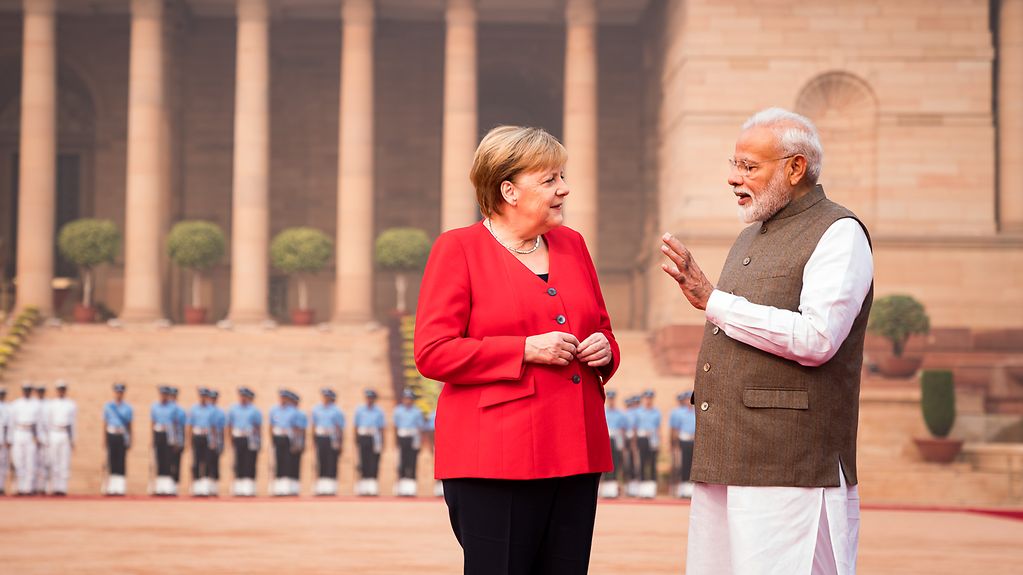German-Indian government consultations
On many of the crucial issues that will shape the future, Germany and India intend to step up cooperation. The two governments decided this when they met in New Delhi. Chancellor Angela Merkel pointed to a special tradition that links the two countries.

The Chancellor's visit began in New Delhi, where she was greeted by Prime Minister Narendra Modi
Photo: Bundesregierung/Kugler
Climate change mitigation, digitalisation and education – in these and other areas, Germany and India intend to cooperate more closely. At the fifth German-Indian government consultations in New Delhi, a number of agreements were signed. This demonstrates "the wide spectrum covered by our cooperation", as Chancellor Angela Merkel stressed on Friday when she gave a statement to the press along with India’s Prime Minister Narendra Modi.
India has a huge potential in the fields of digitalisation and artificial intelligence, said the Chancellor. The two countries agreed to maintain a more intensive dialogue on research in the area of artificial intelligence. There is a long tradition of academic contacts between the two countries. "After all, 20,000 Indians are studying in Germany, and we would be happy to see more," said the Chancellor.
Getting to know Indian culture better
Germany and India also intend to cooperate closely in the field of sustainable development and climate action, announced Angela Merkel. India’s CO2 emissions are comparatively low, but its future industrial development should, of course, be as sustainable as possible. She can only congratulate the Prime Minister on India’s use of renewables, which already have an installed capacity of around 74 GW.
In the cultural sphere too, the two countries agreed to forge closer contacts. German and Indian museums, for instance, are to help one another with research and with restoring exhibits. In general, people from both countries have the chance to get to know one another better. "Germany still has a lot to learn, because Indian culture is not yet as well known as it should be," stressed the Chancellor.
Visit to the Gandhi memorial
Before the joint session the Chancellor laid a wreath at the site where Mahatma Gandhi was cremated. With his non-violent resistance, said Angela Merkel, Gandhi "inspired many people in the world". She drew parallels to German history. The Berlin Wall also fell peacefully. These are traditions "of which India and Germany can both be rightly proud".
Business and climate
The last day of the Chancellor’s visit to India was dedicated to business and climate. On Saturday, Chancellor Angela Merkel gave a speech at the annual general meeting of the German Chamber of Commerce in India, before visiting the German company Continental. In India, Continental is conducting research and development in the fields of autonomous driving and "industry 4.0", the digitalisation of traditional manufacturing, as well as working on a solar-powered metro station. With German assistance, part of New Delhi’s metro network has been fitted out with solar power.
A total of eleven ministers accompanied Chancellor Angela Merkel to India. Alongside Federal Foreign Minister Heiko Maas, Federal Agriculture Minister Julia Klöckner, Federal Education Minister Anja Karliczek and Federal Government Commissioner for Culture and the Media Monika Grütters attended the talks. A business delegation also flew to New Delhi with the Chancellor.













